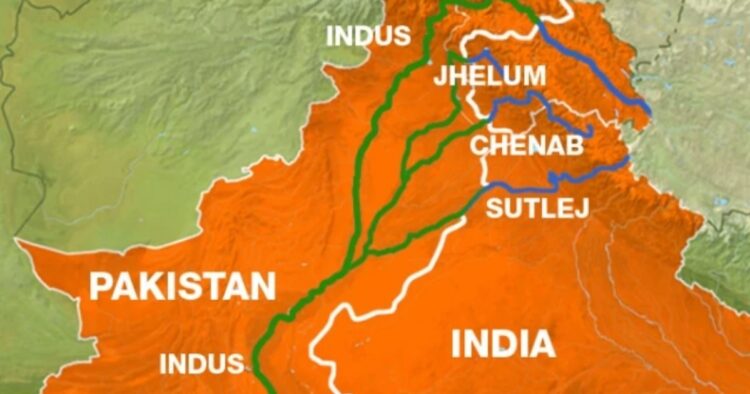KEY POINTS
- India suspends Indus Waters Treaty after Pahalgam terror attack, targeting Pakistan's water lifeline
- 80% of Pakistan’s agriculture depends on rivers controlled by India under the treaty
- Suspension threatens massive crop failure, food crisis, and economic collapse in Pakistan
In a world where wars are often fought with weapons, India has just turned off the tap, and the ripple effects may be more devastating than a battlefield. This is not just about rivers; it’s about power, survival, and a treaty that could bring an entire nation to its knees.
What Is the Indus Waters Treaty (IWT)?
The Indus Waters Treaty (IWT) is a water-sharing agreement signed in 1960 between India and Pakistan, with the World Bank as a broker. At the time, it was considered a rare diplomatic success amid rising hostility post-Partition. Under this treaty, India gained rights over the eastern rivers, Ravi, Beas, and Sutlej, while Pakistan was allocated the western rivers, Indus, Jhelum, and Chenab. Although these rivers flow from India into Pakistan, India agreed to let Pakistan use the lion’s share of the water. The treaty also laid out procedures for dispute resolution, regular meetings, and information sharing.
Why Is This Treaty So Critical for Pakistan?
Pakistan’s very existence is tied to these rivers. Nearly 80% of its agriculture relies on water from the Indus, Jhelum, and Chenab rivers granted to Pakistan under the IWT. Agriculture in Pakistan contributes over 21% to the country’s GDP and employs nearly half of its workforce. If this water supply is disrupted, the consequences would be dire: crops would fail, food prices would rise, exports would fall, and mass unemployment could spark unrest. These rivers feed not just the land, but also industries like textiles, sugar, and rice, pillars of Pakistan’s economy.
In the wake of a deadly terror attack in Jammu and Kashmir’s Pahalgam, which killed 26 tourists, India decided to suspend the Indus Waters Treaty. This is a strategic move with far-reaching consequences. India has frozen all technical exchanges, project approvals, and data-sharing under the treaty. While it hasn’t physically stopped the water yet, this diplomatic suspension sets the stage for stronger steps ahead, steps that could include reducing water flow or building storage facilities that divert the water before it reaches Pakistan.
By controlling the rivers at their source, India holds the power to gradually reduce the amount of water entering Pakistan. India can legally build storage dams, channel water for irrigation, or even delay the flow of water at critical times, especially during the sowing season. It can also withhold essential flood data that Pakistan relies on to prevent disasters. All of this, without violating the treaty (if properly interpreted), amounts to a silent, non-violent yet devastating strike.
What Will Happen to Pakistan’s Economy?
If the water flow is reduced or delayed, Pakistan’s already struggling economy could collapse. The agriculture sector would be the first to feel the shock, followed by industries that rely on agricultural inputs. A shortage in water would also mean higher energy costs, as many hydropower stations depend on river flow. The textile sector, Pakistan’s largest exporter, would suffer, triggering a foreign exchange crisis. Rural migration to urban areas would rise, increasing pressure on already burdened cities. It’s a chain reaction that touches every part of the country.
Pakistan may take its case to the United Nations or the International Court of Justice, and it may pressure the World Bank to intervene. But the treaty itself allows India certain flexibilities in case of a “material breach”, which India can argue is justified due to Pakistan’s continued support of terrorism. In an increasingly multipolar world, international sympathy alone may not be enough to stop India, especially when global powers are rethinking old alliances and viewing India as a rising force.
The water dispute is not new. In 1948, just after Partition, India briefly stopped water to Pakistan, causing panic. That led to the eventual formation of the IWT. Over the decades, even during wars, the treaty remained intact—until now. This latest suspension marks a fundamental shift in India’s stance: diplomacy will not shield a country that harbors terrorists. The message is clear—actions have consequences, and even water can turn into a weapon.
India has found a way to strike Pakistan without crossing borders or blatantly violating international laws. It’s a strategic, non-lethal method to force accountability for cross-border terrorism. Pakistan, already grappling with debt, inflation, political chaos, and food insecurity, is now staring at a drought of biblical proportions. The suspension of the Indus Waters Treaty could very well be the tipping point that collapses its economy, stirs public rage, and isolates it on the global stage.
The Indus Waters Treaty was once hailed as a symbol of peace and cooperation. Now, it stands as a potential trigger for economic destruction. If Pakistan doesn’t change course, India may tighten its grip, and this lifeline could become a noose. The clock is ticking, and the rivers are no longer just water; they are a warning.

















Comments